“18th September 1944. Spanhoe airfield, early morning.
After fourteen "STAND TO'S" - i.e. possible operations - we were now firmly convinced this was to be 'THE BIG ONE'. We lowered ourselves from the truck with our heavy and bulky equipment
and stood by our troop aircraft, with chalk mark 725, awaiting orders. There was a delay on take off because of fog. Tea was available and much appreciated! Capt Brown at last told our stick (the sixteen on our plane) to stand in line to check and adjust our equipment, each checking the man in front.
Once inside the plane, we divided into two rows and sat down on metal seats lining each side of the fuselage. Jumping number nine, I sat half way down on the same side as the exit door. Taking off at 12.10 hrs we had a two hour flight, each man with his own thoughts. One of my thoughts, but briefly, was, 'So this is why I volunteered for the Paratroops and that great extra payment of one shilling a day'. To be honest, my thoughts were numb. I had been trained to follow orders, and this is what I was doing.
A sudden burst of flack and a jolting of the craft. We were approaching the 'drop zone'. Capt Brown called for "stand in lines" and we clipped our parachute hook to the static line and checked that the man in front was O.K. with a pat on the shoulder. Red light on. Capt Brown, with our dispatcher an American aircrewman, stood in the now open door. Heart thumping - green light on - Capt. Brown away - shuffle forward up to the door and out. My God, no going back now!
A snap as the chute opens. My heavy equipment drags. Are those bullets whistling by from machine guns? Looking around, I control the chute. BANG! I hit the ground in less than ten seconds. Yes, they are real bullets!
All around, there are hundreds of chutes in the air and dozens of planes. The planes are so low - 800 ft. How can they be missed? - but then some are hit. I shudder and turn away. We had been told the 'Bosche' knew we were coming and they had been well prepared. Some of the lads who dropped on Sunday were to control our dropping area, and a very good job they made of it against overwhelming forces.
The drop zone was a vast heather-covered open heath and our briefing was to collect in the north east corner. There would be blue smoke as pointers. The north east corner was easy, but blue smoke in a battle zone is not very clear. Ducking and diving, to minimise being a possible target, I stumbled on to our advanced party as instructed. I looked back and saw the heath ablaze from the fire-fight that was taking place as the Germans opposed the drop.
The 4th Squadron is divided in to four [three] sections [parts], Troops 1,2,3 and H.Q. My Troop was 3 and my officer was Capt. Brown. Later we heard that Major Perkins, our Squadron O.C., was wounded and six other ranks were also casualties. The majority of our containers were also lost on the drop zone.
A straggling collection of each Troop moved off at l 7 .00 hrs to form a defensive position for the night south of the railway line\ from Oosterbeek to Arnhem. Mortar fire, heavy machine guns, and rifle fire was continuously around us, with the occasional heart-stopping sound of heavy tanks moving ever nearer. The sound of battle south of the Rhine could also be heard – the many, many h-r-r-umps of heavy artillery and tank fire. At that time we felt that the XXX Corp were well on their way to relieve us. How wrong we were! With nightfall things quietened down - even the Germans needed a rest.
So ended Day One.
To help understand our position I need to explain a few points: Our D.Z. (drop zone) was about 6 miles North/West of Armhem with the village of Oosterbeek approx half way between. The complete area West of the D.Z. to the outskirts of Arnhem was light woodland. There were tree lined roads running West to East one and a half miles North of the D.Z. One adjacent to the D.Z and one l /2 mile above, parallel to the river Rhine, all roads led to Arnhem. There was also a criss-cross of roads and lanes running North/south.
Because of the woodland, the battle area was made difficult for the Germans to form any major attack with tanks etc, so their main attacks had to be along roads or lanes. Our strength therefore lay in holding the cross roads.
We heard the 2nd Brigade [Battalion] were holding Arnhem bridgehead, including the bridge: XXX Corps were on their way to relieve them. After terrible casualties, it was decided to form a second bridgehead West of Arnhem to include Oosterbeek at the 1/2 mile base along the Rhine, projecting Northward in the shape of a thumb for approx l mile, and to include the Western edge of Oosterbeek
Being Royal Engineer Paratroopers we were involved with mine laying/lifting, explosives, flame throwers, lifting of moving tackle, etc, also back up to infantry with PIAT guns and ANTI TANK
GUNS.
On l 9th Sept '44 after a night of intermittent shelling and the odd rifle fire we 'stood to' at 0500 hrs and received orders to move off towards Oosterbeek. At Wolfheze rail station the column stopped. Trouble ahead! ! Then all hell broke loose.
The Germans had outflanked us - behind, ahead and from the North. Firing seemed to be coming from all directions: ours going out, theirs coming in. It was sheer hell.
At this critical stage, German fighter planes appeared and I saw strafing along the road and up to and over the railway lines at the station. We all dived for cover and stayed there "eating dirt" until the fighter planes finished their attack.
There was confusion all around with few Officers to give orders. The only way was South, so in disarray we withdrew. This meant going back over a railway track via quite a high embankment. I was one of a party ordered to stay and assist jeeps etc over the track. It took eight men to bounce a jeep with trailer over each track. We managed four, but then one became completely stuck, unable to move. With sniper fire and mortar shells all around we started losing men, so we made a run for it.
It was all too close for comfort!
I continued South along a tree lined road. There were beautiful houses and lovely gardens along the way - many damaged by shelling - and the owners came out waving and cheering us as Liberators. Sadly they were soon to be disappointed and left to their fate.
Also along the road were blown up jeeps, wagons and German armoured vehicles, many with their dead drivers still inside. It was all too much to take in. Somehow it didn't seem real. I was in a complete daze and my actions became automatic.
We moved off the road and went through woodland. At dusk we were instructed to 'dig in'. My position was on the western edge of the woodland 50 yards from a road - the middle one mentioned earlier. Ahead of me was some pastureland about 400m x l 00m. This position proved to be set as the final bridge head, near the top of the "thumb" on the West side. We were told this line had to be held at all costs. With the danger of strafing heavy digging-in started. The soil was soft and leafy but we were only able to form a shallow groove.
My nearby companions were all strangers to me from an Infantry company. I felt very lonely and a bit 'bomb happy'. I stayed in this spot until late on Friday the 22nd of September (this was in fact intact until the 25th September 1944 when the final withdrawal was made), Then began three days of hell, including Panzer Tanks approaching within 50 yards, then damaged by a PIAT gun continuous attacks across the pastureland, also the verbal taunting by loudspeakers telling us what was happening at the bridge and to our folks at home. The Germans also had a wicked mortar we called "Wailing Minnie", this mortar fires a dozen shells in approx 12 seconds. They wail in the sky, you heard them coming from a distance. If the first one exploded in front of you and the next one closer still, you willed God that the third one would be behind you ...
Late on the 22 September during an attack I was hit in the leg by a mortar splinter. It was very hot and painful. At dusk a Medic was called and he helped me back to the dressing station for treatment. The dressing station was an old family house with three storeys and a basement and was full of dead and dying. This was another shock to my system - blood, bandages, stretchers loaded with injured: men who had lost limbs, men with bloody bandages on their heads. I felt guilty being there with just a leg wound.
After a night at the dressing station I heard contact had been made between our medics and the German medics and arrangements were being agreed for a "cease fire" so that the wounded and dead could be attended upon. The medic jeep at the dressing station could take one stretcher on the bonnet one stretcher overhanging at the back, two walking wounded plus driver and one medic. I was one of the walking wounded.
There was heavy machine gun and rifle firing and mortar shelling all around outside the dressing station. With nerves on edge, my feelings impossible to describe, we heard very loud whistling and shouting. But gradually there was peace, and with a medic holding a white flag we moved out into what had been a crossfire of death. We moved down a lane lined with German soldiers in ditches, all heavily armed. They glanced up at us as we passed. There seemed to be Germans everywhere. Just a short drive, and then along a short lane, and we found we were back in our own defence positions where there was a main Dressing Station. Half an hour later the curfew was lifted - and Hell on Earth was back again.
This dressing station was also nearly full, the sights, sounds, and smell never to be forgotten. I received further attention and was given medication and dressings for self use, leaving the medics free to attend to the more seriously wounded. It was here that I saw the extremely brave women of the house acting as orderlies dressing, cleaning and comforting the wounded and dying. Our doctors and medics worked continuously, seemingly unaware of the danger they were in.
A cup of tea appeared for me and I was allocated a fairly safe place on the steps to the cellar, the floor of the basement being full of stretcher cases. For three days and nights we huddled together on those steps - dozing, dreaming of impossible things, listening to continued shelling and knowing our dressing station house had the occasional hit and was becoming more and more damaged, killing some of the men above. The worst hits would send dust and debris down the cellar steps.
In the afternoon of Monday 25th Sept an Officer making his rounds gave us the final news that the 2nd Brigade [Battalion] had been moved off the Arnhem bridge, having held it for six [four] days, which was longer than the original plan. The Officer then explained that we were to withdraw back over the Rhine from our bridgehead at Oosterbeek that night. All those able to walk were to wrap their boots in towelling to deaden any noise since there was up to a mile to walk down to the river. He said there would be white tape to follow and Guides at certain points. Departure to start at midnight and XXX Corp were sending men and boats over to complete the crossing. Those unable to walk (which included me) would have to give up to the Germans the following morning.
The Officer took as many names and numbers as possible, mine included. He promised that if he made it over the river he would let our families know we were alive at this time.
(It should be recorded that ALL doctors - and most of the medics agreed to become prisoners along with us so they could care for the vast numbers of injured left behind.)
The night of the 25th held many fears - for those going back, for our loved ones back home with no news, for ourselves having heard how the Germans treated prisoners. A long night gradually got quieter. We heard heavy firing down by the river. It was some relief to hear no strafing BUT - what does tomorrow hold? I am alive, but I'm about to become a prisoner of war!!
To be a prisoner of war.
It is a dark, an inner fear and a feeling of loneliness, with time, for one's thoughts to play havoc, my situation is so, so, strange. Twelve to fifteen men each with their own fears and inner thoughts After the last nine days and nights of hell and fears out of this world, this cannot be classified as ‘training’. There was no talking, this was eerie, silence after the noise of battle, then an occasional cry of pain, heavy breathing, a cough, a shuffling movement of trying to get comfortable, have we any water left?
Hours forward and the stress began to tell. "What's that shooting?". "Did you hear shouting?", "It's getting light", "Is there anyone upstairs?".
A sudden noise, rushing footsteps and a medic burst into the basement with news, The Germans are searching each building and throwing a grenade into the basement before searching the building. Get out A.S.A.P. and find something white as surrender flags. Two of us helped a badly wounded colleague, who cried out with pain, up the stairs and out into the daylight 06.30 hours and sunny, as if by magic others found sheets etc and we huddled together for safety and to instill courage between us.
The surrounding area was bad when I arrived at this centre but now impossible to describe, trees and hedges stripped of foliage and small buildings flattened, gardens unrecognisable, how had we come out alive?
We had been fighting the SS storm troopers and they were the first we saw coming towards us, fully equipped, helmets of their unusual look, grenades on their belts, ammunition hanging round their necks with machine guns in their hands. They were tough guys now (just as we thought we were in battle) battle weary but THEY had the swagger of the victor. They appeared to acknowledge their victory BUT also gave us credit for the battle we fought. These men rounded us up and with medical help we staggered a couple of hundred yards to an assembly point, we were handed over to the Pioneer Corps, very young boys and old men. We were pushed and rifle butted about to sort out the actual wounded from those able to be sent straight to prison camp. A chance for the young to steal watches or any valuable property from us. (By young I mean l 7 - l8 year olds and by old l mean 50 - 60 year olds.
Transport lorries arrive and those selected for hospital boarded the transport. My leg wound was such that they considered it required treatment how lucky could I be for few of those sent to prison camps survived the war. (i.e. march to Germany.)
We travelled out of Oosterbeek, through the outskirts of Arnhem and then north to a place I later knew to be Apeldoorn where we were taken to an old Dutch military barracks, one of the three storey blocks adapted for hospital use. I am really in a daze and just follow orders up stairs two flights turn left to the end of a very big room full of beds with palliasses and a blanket. I flop down on the last bed, my leg giving much pain, and I collapsed with relief. I lay on the bed and slowly the stresses of the morning and the dazed situation I had been in pass away and I began to take note of my present position. Our arrival numbering approximately 200 men added to the already captured men of the division of some 350 men many badly wounded. We were spread though the barrack blocks each three stores high and positioned along one side of a large parade ground with further buildings in the dis once. Our medics had done wonders in setting up a field hospital with one of the blocks, of course with help from the Germans.
The Germans would patrol inside the building among the wounded but at the request of the RAMC they were put on guard outside. Many guards on point duty and some on patrol night and day.
After a couple of days we were allowed outside for exercise, this of course being limited to within the three block area. On my first walk I was amazed to meet up with one of my own platoon [Troop], a man by the name of ‘Jo’ Johanson a [Lance] Corporal, you have no idea the lift that gave us both and ‘Jo’ agreed to come back to my block and claim a bed there.
Our food was little but welcome breakfast time we had a slice of dark brown bread with a spread of something and a tin mug of ersazt coffee, midday a mug full of vegetable soup and in the evening similar to breakfast.
Every night and sometimes during the day we used to hear guns and bombs in the distance and we still imagined the second army were getting nearer and would be with us in a few days.
One day an RAMC officer came into our room on his way round each block to tell us how we stood. He informed us that the Germans were constantly telling him that 500 men were fit for travelling and must be made ready to move. Our M.O kept telling the Germans that this was impossible as most of the wounded were too bad to move. The office asked us to help by malingering as much as possible and not appear too fit.
I arrived here on Tuesday 26th September 1944 and by the Saturday 30th September '44 the German medical staff M.O's and orderlies started sudden inspections of all wounded and found as they expected many with little cause to remain in hospital, along with dozens of others ‘Jo’ and I were on the list to leave, we knew transport was being prepared, this being trains to Germany.
I boasted openly that -I would be home for Christmas and we both talked of escape - pure BRAVADO.
Our escape plan, for there was one, had to be at night although it was near a full moon, we would go via the fire escape ladder, across a barrack road, a verge, a hedge, a fence and keep running! Not a good plan but we must try. We asked some of the lads to be our lookouts to check via windows the position of the patrolling guards after midnight and when they were least attentive.
It's midnight, all is set we are signalled all is clear and we open the fire door and step out onto the first steel platform with our boots hanging around our necks, all is still, We look around and then down the steel ladder leading to the ground, one more step and we both see movement below, a German guard looking up at us width his rifle at the hip. We froze and then in panic dashed back inside, stumbled to our beds and feigned sleep. As we did this all hell broke loose, guards shouting, lights coming on, guards burst into our room rifles ready and prodding those asleep, Just panic, panic all around but my head stayed under the blanket. Sunday October 1st 1944 (a day and date to be remembered for the rest of my life). I felt guilty, for the upset the night before, upsetting for all concerned but we had tried and to be truthful felt proud of our endeavour.
A good wash and shave after our bread and coffee and feeling better we made our way down stairs for some exercise and fresh air. Our Chaplain had asked for a service to be held this morning, it was granted but chairs were required for some of the wounded. These chairs were to be collected by us from a three storey block on the far side of the parade ground approx. 150 - 200 yards away. ‘Jo’ and I walked along with the working party under the watchful eyes of four guards. We entered the block and my main concern was finding cigarette butts and there were many, up the stairs for more chairs? And more dog ends. The block appeared to be set up for officers, small cubicles, rest rooms and open areas. My search for dog ends continued and I also found a German 1938 diary. I had no idea why I kept it, but it was useful later. Time goes by and ‘Jo’ and I are on the third floor and we hear "a silence", uncanny. We look out of the window and see our working party with chairs and four guards well on their way back to our barrack block, and for the service to be held.
It's a sunny October morning and from our new vantage point we have a completely different view of our surroundings. Looking back to our three blocks we are amazed at the number of our soldiers taking exercise along the front of the buildings and many just sitting on the steps leading up to the main entrances. Possibly being Sunday there were not many Germans about other than the guards and not a soul on the actual parade ground, all must walk around this "hallowed piece of army ground". To our right we could see the barrack perimeter fencing and then vegetation between the barrack road and fence, which appeared to run along and in a stream, beyond the fence, buildings, could be houses, and a road edged by hedges.
What should we do now? A situation completely unexpected. Various options came to mind the first to run after our party, NOT GOOD, wait an hour to see if we are missed, possibly wait until dark and try to escape, we had no further plan to follow at night time. With all these thoughts going on our stomachs were crying out for a little food.
We compromised and decided to wait a while then go back for food! Time up and we proceed down the stairs out into the open, all seems quiet and here are two British soldiers in UNIFORMS, walking along a German barrack road (with no chairs). Luck told us to walk back the long way round the parade ground this took us along the far road parallel to the hospital then the long leg return which took us towards our block with the many soldiers still "exercising".
We hear a considerable noise, shouting and whistling, it came from our men and this appeared to attract the attention of the guards, a perfect diversion. Second nature took over, ‘Jo’ and I looked at each other, nodded and dived for cover just off the road. A breath, then do or die, up and running though the vegetation, past a hut and up to the fence, no stopping we rolled down into the stream under the fence wire and up the other side. Ahead we saw a row of houses just beyond an allotment plot and roadside hedge with ditch. Please God we have got so far, let us make it to the road. Running doubled up through the allotment we threw ourselves down into the roadside ditch, wet cold and desperate. We freeze and wait to hear if our escape has been noticed. What ARE we doing, it's mid-day, in uniform, no plans, some pain, in German territory,
BUT we have a buzz knowing we, of all those in the block got away. (Later information confirmed only one other, an officer, escaped from the hospital ward of this camp).
There are a couple of men, young, in the roadway, they walk past but look directly at us. A couple of minutes later they returned and ask us if we were English. When we both replied yes, we were told to stay there.
About half an hour later they both return and tell us to be quick and follow them down a path between two houses to the back garden and into a small air raid shelter dug deep into the ground, with a hatch door, straw on the floor and two vent pipes. We tumbled in and the door was shut it was quite dark but a shaft of light helped us to see a little. Minutes passed and the door opened, a plate of beans and potatoes put in and a request for our wet clothes for them to dry. Our uniforms are special to us but wet through and the cold gave us little thought of refusing. The hot beans and potatoes the first hot food for over two weeks was more than welcome. Our nerves seemed to get the better of us and we laughed and joked over foolish things of a bravado nature. We were not feeling safe and who would in your underwear in a hole in the ground in never-never land? Noises at the hatch door and two bundles of clothes come in, boiler suits, (our - dress until we finally returned to our own lines).
Very early the next morning we were taken out of the shelter and moved three houses away, We climbed a ladder up into the very small roof space, floor boarded out with two palliasses and one potty. We were unable to stand and told to be very quiet at all times. In the gable end, the end I chose to sit we had a very small window, for better or worse it looked out directly onto the prison blocks where we were held prisoners, 200 yards away. However these wonderful Dutch people did give us a feeling of safety, they were going through hell in this war but we seemed to come first to them.
The German diary (1936) that I picked up when chair hunting now comes into use. I write up my memory of the battle and of being captured, now I am able to keep a scant daily' diary, being careful in case I am recaptured and my diary read by the Germans, (we are with the Dutch Underground Movement who at times are able to pass information of local or national news). I give extracts and some elaborations of daily happenings.
October 2nd, 3rd and 4th.
Boiler suits fit but look strange with army boots. Our Dutch family of three adults and one child are so helpful and understanding, today they share their food although they have little. We are allowed downstairs during the evening for general ablutions and a stretch. One day a head pops up through the ceiling hatch and takes a photo of each of us, later during the evening I am told I must remove my moustache, I look too British and the photos are for a Dutch identity card for us to have on our travels. We hear 1200 "Red Devils" are to be transported to Germany by train tomorrow. There are Gestapo units in the area looking for young Dutch men needed for work in Germany. These men do anything not to go and find hiding places for weeks at a time. We are told this searching is not good for us as they become more frequent and the places to hide become less. We are to move tomorrow.
Oct 5th
There is much air activity and we are overjoyed to hear that one of the first 1000 plane air raids on Germany took place, this news also cheers our friends who have so much hardship and unhappiness. Our move is arranged to be just before night curfew. We walk out arm in arm with our "Dutch girlfriends" the wives of our two men helpers. We are all on edge our hearts thumping. I keep looking at my army boots, they look so wrong. The "girls" do not speak much English so our walk is silent, Twenty minutes and thank God with nobody in sight we went into another semi-detached house, met by another husband and wife. Our companions of the walk left quickly, after very sincere thank you’s, so they could return to their husbands before curfew. How brave these people are they risk their lives, a real risk. A new position, two scared people willing to help lead us upstairs into a bedroom. A bed is pulled away from the wall and shows us a recess between the false wall and sloping roof with a small door access to crawl though, it was very well hidden. We were unable to stand, there are two palliasses, the usual potty, a low watt bulb light. We were allowed to use the bedroom but always aware of a needy return through the secret hole. Most of the time up to now we can hear the heavy guns of battle well south of us and we still have faith in the army coming to our rescue.
Oct 6th, 7th, and 9th.
We hear another 600 "Red Devils" have left for Germany by train. How lucky we are. We both go down with heavy colds, no doubt due to our thorough wetting we got getting away. It's cold at night and our boiler suits are not that warm although we have coverlets. Food is scarce, it was explained to us that we were not eating our home owners rations, the Underground delivered what they could including cigarettes. We became very despondent, time stood still, there was less activity the other side of the river and so our hopes were fading. We are moving tomorrow, early morning and by bicycle, going west.
Oct 10th, 11th, 12th, 13th, 14th, and 15th.
Two of the Underground arrive just after curfew was lifted. They had four cycles, one for each of us, on the rack on the back of ours we saw a Hessian sack and we were told they contained our uniforms, dry and clean!!! The travelling system was for the leader to go ahead, we followed approx 20 yards behind and 20 yards behind us the other guide. Should we be stopped leave the talking to them, they each had a pistol in case of trouble. As we cycled out of one area the "guides" would change with men from the new area. All to keep local knowledge very local, in case of capture and torture, A very big thank you to our hosts and off we went, a few yards and I didn't know what hit me, I was over the handlebars and on the gravel road with my bike on top of me. No one had explained to me that in Europe most cycle brakes work by back peddling. I had done the normal thing of free-wheeling but this put the brake on and over I went. I laugh now but at the time it caused a stir.
Underway and we kept to back lanes and tracks, my thoughts wandered to the sight of two boiler suited men, on cycles, with sacks on the back with army boots, was it a dream or a nightmare? Of course during the war many strange things were seen and unusual forms of transport, we must have blended in.
About 45 minutes passing various vehicles and farm tractors and other cyclists, we kept formation and almost without notice our guides changed once and we had seen no guards or Germans. We were hoping for a larger hiding hole than the last one, imagine our surprise when we stopped by a wooden field gate, already open, through which we went. Off the cycles and pushing them along tracks between allotments as far as we could see in either direction. There were also many allotment sheds of various sizes and conditions. Yes, one of these would be our hideout for the next few days. Our shed was obviously a regular hideout, there were chairs, a stove, bedding, cups, water, plates, knives, cards and many bales of straw around "the living area". During our stay here there were always at least two Dutch Underground with us; they were no doubt also on the run. A well prepared system seemed to set in. We received food twice a day with one hot meal brought in from some outside source. We also received regular news of the battles, Gestapo movements etc. Although we now have our uniforms back we kept to the boiler suits in case of a quick getaway.
On the second day we both received, out of the blue, our Dutch Identity Cards, complete with new name, mine being ADRIAN GERADUS VAN DER BOCH our photos, most strange without my moustache, there was an official German stamp and signature. They were marked 2e EXAMPLER as the original had been lost in the bombing, I was born in DENHILDER and my occupation a CAKE AND BREAD BAKER this being a reserved occupation. These cards were to be folded the correct way and we were taught to say HERE YOU ARE and THANK YOU in German if requested when stopped. Our guide explained we need not be perfect as the Germans didn't understand Dutch any-way. Our favourite meal became tiny squares of pork fat fried with potatoes and runner beans.
There was little variation although one day we had seasoned grass instead of beans. The allotment was close by a busy rail line and one afternoon all hell let loose as a very long goods train was passing and it was bombed by a single British plane and with a lucky hit exploded the train full of fuel. For many minutes we heard the rumblings and then the roar of the engine that had been derailed. There were sirens and whistles all around and we kept an extra low profile for a couple of days. Very early one morning, just after dawn, there were many voices shouting out in the allotment there were people running close to our shed, we also heard small arms being fired, with some panic we dived behind straw bales to hide, our hearts pounding in a real sweat, what the hell was going on? A short while and all became quiet, one of the underground left the shed to find out what was going on, we waited and waited for his return, more worries, but after two hours he slipped in through the shed door. We could tell he was most concerned about what had taken place and then explained the Germans were following a lead to find some young Dutch boys hiding in the allotment and needed for war work in Germany. The underground knew where they were and instructed them to make a run for it, letting the Germans know, as the English were nearby. We since know the lads got away, but how brave and for our sake a very near thing for us. We are told the whole area is to be searched and we must move on, we have twenty four hours.
Oct 16th, 1 7th, 1 8th and 19th.
I stop my own story now and tell of the behind the scene action we were told about later. Churchill was aware of the many airborne troops left behind after the withdrawal, many had been dropped miles from the action and were not involved with any fighting, but were still being hidden by the Dutch people, instructions were given to GIVE HELP. It became obvious that General Dempsey and the XXX Corp were not going to advance and an "escape en masse" of the parachutists and airborne troops left behind and still hiding was, therefore planned. For success four requirements were necessary: A safe area of concentration; a safe means of reaching it; the discovery of a suitable gap in the German's defences of the Lower Rhine and the support of the 2nd Army It was known to 2nd Army that north of the Rhine a great influx of German police and Gestapo were rounding up men for labour and so searching houses, this made concealment of British troops more difficult. The requirements were met and the escape date fixed for the night 22nd/23rd October. On the 22nd the officers and men taking part in the escape were then contacted and all reached the rendezvous, all with thanks to the incredible bravery of the Dutch Underground men and women.
My story continues, it's 5am Monday 16th October, our guides arrive with cycles, the same plan set out for moving and distances to be kept. We are all quite emotional in our goodbyes, we have bonded with these Dutch people and feel for their hardships and family problems. They have been so generous in their giving of themselves and we can give nothing in return but thank you's.
We are in our third week as escapees and my nerves are a bit on edge. I only see trouble ahead in the journey, out in the open, never knowing what is round the corner. We have a three hour journey with numerous guide changes', it is remarkable how this keeps happening almost without notice. German lorries, cars and motorcycles are regularly passing mostly in the opposite direction. We keep to back lanes if possible but there were sections of our journey along main roads. Our journey was again first north then westward and finally south towards the Lower Rhine, but it is still miles away. I am getting tired, to cycle so far, not having exercise for days and little food, it all seems too much but thank God we have turned down a narrow farm track and this is our next secure "home". A neat, but very old farm, with out-building, chicken, pigs and a cow or two all loose around the buildings. With no sense of security the farmer and his wife greet us all in the yard like old friends. Our guides introduce us and explain they are to look after us, keep out of sight but you can move around the farm, They, the farmers, don't speak English but one of us will come each day, we are in touch with the army and will bring news. There were so many questions to ask but they had to go, we learn the underground are always on the move. Their last instruction to us was that if we see any movement down the lane we must hide in the barn, with the straw.
No English and no Dutch but we soon get on, a meal is ready for us and we are shown a real bed to sleep on tonight. The farmer's wife a motherly soul, arranged for us both to have a strip down wash in the outhouse, plenty of hot water from the fire heated copper boiler. The following day a Dutchman came with news and to check all was well. He explained there were a number of British being hidden over a large area and talk of the XXX Corp advancing again. Our safe house was one of the best to date no Germans had been along this dead end road to the farm, but we must be careful. The farmer has two sons and had not heard from them since the war started, they would do anything asked of them. Days passed, we spent most days in the farm barn and nights in bed, after an evening meal in the old fashioned kitchen. (Potatoes, beans and pork). We received no special news but always be ready to move on, our informers hear news from over the water, i.e. the 2nd Army. What does that really mean?
Friday 20th October early, a visitor, no, two visitors and four cycles. We are to move out; this is it what we have been waiting for. A great big thank you to the farmer and his wife who gave us a big hug and bread and cheese for the journey Travelling all as before, we may have a stop as there is a long way to go in a round about route. The journey proved to be uneventful although after a couple of hours I noticed we were regularly passing Dutchmen cycling in the opposite way each pushing another cycle. (It was not until twenty fours hours later I realised they were returning cycles used to transport earlier troops to the collection point.) Things moved with a blur, our front guide suddenly stopped along a wooded lane, waited for me grabbed my cycle and pointing in the wood said GO THERE. ‘Jo’ behind me was told to do the same. Our uniforms so carefully looked after and kept with us we had little thought and went with the cycles and were lost forever.
We dived into the wood and soldiers appeared everywhere directing and guiding us further into the wood. A Regimental Sergeant Major stood before us, my God back to earth with a bang, he asked name, rank and unit and said as engineers, although in civvies go left. We followed guides; all in uniform and told to “go to ground” two yards apart along an imaginary perimeter line. I was getting more concerned about losing my uniform Jon and I appeared to be the only ones in civilian dress and we still had thoughts of being captured and classed as spies, this meant being shot, nothing could be done about it so we settled down into the earth and leaves to await our next order. It was a good time to eat our bread and cheese and discuss our journey here. Early evening, we are to remain here for the night and a sandwich was supplied, Time drags, there is little noise each side of us and it is very cold with only a boiler suit on. Early morning and voices from nearby, we move towards them, it was like an H.Q. on manoeuvres, a dozen men all round a small fire with tea, no milk, and sandwiches all in battledress I borrowed a can for some tea with plenty of sugar and scrounged a sandwich, (where did they come from?) These men are getting ready for today's intake of troops they tell me there will be about 100 men altogether and that we will be moving out Sunday night if all goes well. ‘Jo’ and I were some of the first to arrive in this woodland and our cycles of yesterday will bring more in today. God knows how but some came by lorry load, covered by farm material. Many came at night, still in uniform, but with special Dutch guides, through the countryside.
Sunday morning, it was so cold during the night but we had one thought, we were going home. In groups we were given our instructions. Midnight we leave in single file, try to keep hold of the man in front, it will be dark. Glider pilots will act as guides on route, they will have set the route with white tape where needed, of course we must make as little noise as possible and take orders when we get to the river and boarding boats, a rush to board can turn one over. I was a little concerned being still in civvies and doubly worried because ‘Jo’ and I were to be the last in line.
As the day passed by we had less and less to say, like going into battle our thoughts turn to problems ahead and what was the chance of making it, two miles to the river was a long way and there must be Germans about somewhere along the line. It was a dark night and the minutes crept on to midnight. We started and I was amazed at how long it took for 100 men to start the long journey down to the river and for us to get started Then at a steady, pace we are off, so dark we could hardly see the man in front. The white tape helped and the occasional Glider Pilot guided us along the way, they then followed along behind (now we are not the last) and took up the tape, We walked along paths, lanes, roads and gardens, I thought with much noise, but with no challenges.
We suddenly bunch up and find we are very close to the river, hint of moonlight and a glint of the river about l 00 yards ahead. Now we must wait for the call from the boat controller, The air is suddenly ablaze with mortar, and machine gun fire, We see tracer bullets crossing the river some 100 yards both upstream and downstream from our position, these tracer are the guides for the Canadian R.E's boats to come between. They are coming, we hear the first outboard engine, above the noise of the firing and we are ordered to move off over the muddy banks, slipping and sliding towards a dark outline of a boat prow with the controller standing and ready to receive us. The boats come in a steady flow, load and slip away into the fast flowing river. My turn comes and I'm off like a terrier, head down the mud sucks you down but with extra strength, perhaps the fear, I clamber on board heads down and we are away. Shells start falling the Germans are awake and know something is afoot. A cry and shooting ahead, a boat is hit and turned over but near the south bank. The flow of the river is very fast and our boat master has difficulty in steering our craft a straight course, what seems hours but really only minutes we bump into the south bank, and scramble out, head down up the muddy slope to be greeted by Canadians [Americans], big strong lads almost throw us into the back of a 3 ton lorry to be driven off into the night. Leaving gun fire and flashes all behind.
SAFE AT LAST.
Source:
Kindly donated by R Hilton
Read More
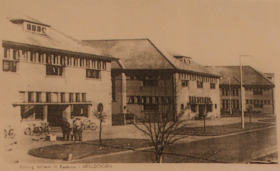
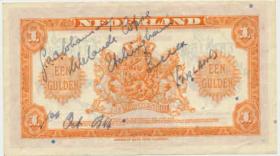
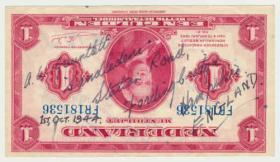
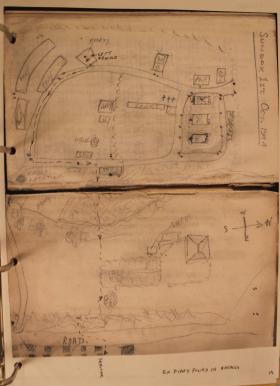
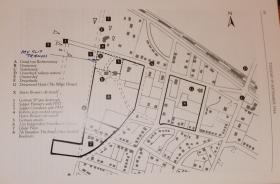
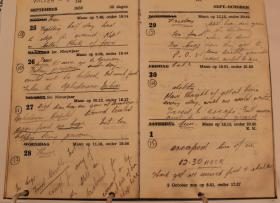

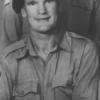
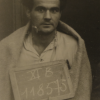
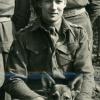
Latest Comments
There are currently no comments for this content.
Add Comment
In order to add comments you must be registered with ParaData.
If you are currently a ParaData member please login.
If you are not currently a ParaData member but wish to get involved please register.